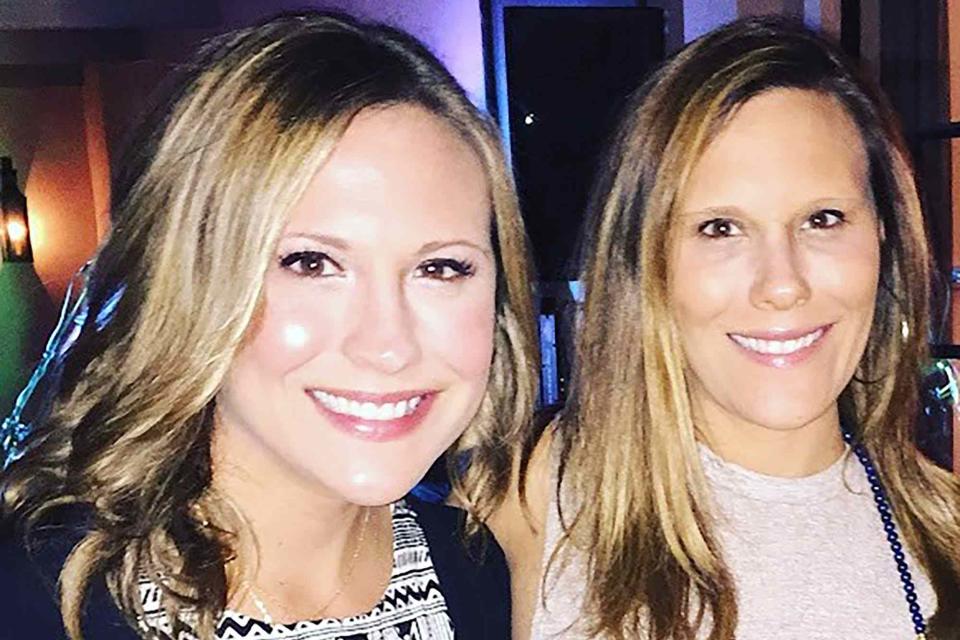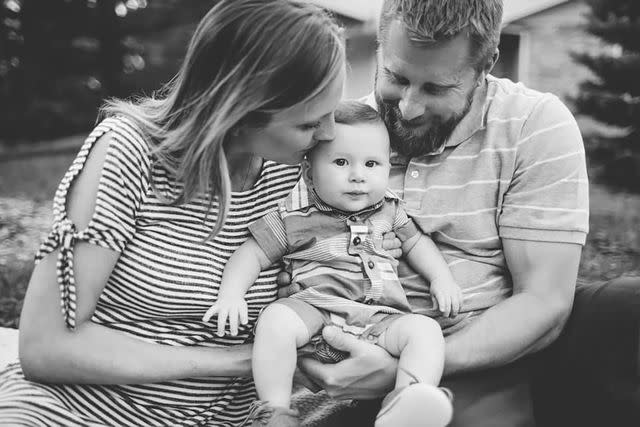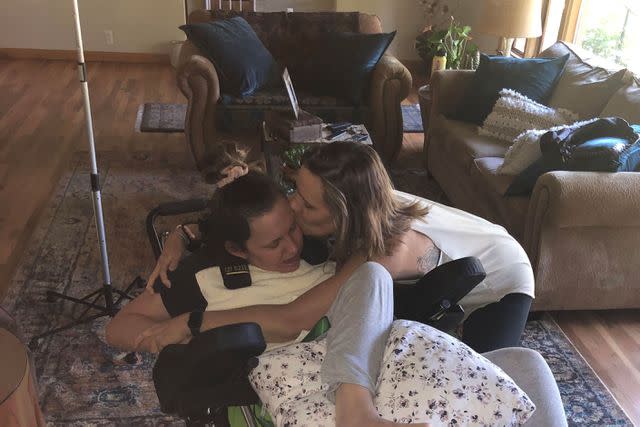Young Mom Becomes Twin Sister's Caretaker at 35 After Cardiac Event: ‘The World Stopped Moving for Me’ (Exclusive)
Sarah Rasby found the experience of caring for her severely disabled sister so challenging and profound that she decided to devote herself to caregiving advocacy and research

Courtesy of Sarah Rasby
Erin Lewis and Sarah Rasby in 2015 in Scottsdale, Ariz.Growing up in Omaha, Nebraska, Sarah and Erin Lewis were the type of twins who shared each other’s secrets.
“We were best friends,” Sarah (now Rasby), 40, tells PEOPLE exclusively. “We knew everything about each other.”
The twins went to the same high school and college, and they both moved to California for work. Although they lived in different cities, they spoke every day. “Erin was my go-to person,” says Sarah.
A few years later, they both ended up back in Nebraska. Sarah was living in Lincoln and was married with two kids, then 7 and 10. She was co-owner of a yoga studio. Erin moved home to Omaha to take care of their father and stepmother who had both been diagnosed with cancer. Soon she had a fiancé, Ty Prucha, and a baby on the way.
But on November 12, 2018, Erin suffered a sudden cardiac event after a trip to the grocery store.
“It was on a Monday night and I was bathing my kids,” Sarah recalls.“Life completely changed when I got that phone call.”
Erin was still a new mom when she collapsed — her son Teddy had just turned one.

Courtesy of Sarah Rasby
Erin with her fiancé Ty Prucha and their son Teddy, 6 months, at home in Lincoln, Nebraska.“Because she was without oxygen for 20 minutes, she had a severe anoxic brain injury,” says Sarah. The neurological damage left Erin severely disabled.
“She couldn’t communicate much anymore," Sarah recalls. "At the beginning she would say yes and no, but it was like — and I don't love this term — when someone is trapped in their body. She wasn’t paralyzed but she couldn’t move at all.”
The impact on Sarah and the rest of their family was immediate and far-reaching.
“The world stopped moving for me,” says Sarah, who was listed as Erin’s power of attorney. “I never thought in a million years would I be caregiving for my sister at the age of 35 or making serious decisions for her life. It completely changed the course of everything we were doing professionally, personally, in our lives. I became focused on my sister and her needs."
Erin’s fiancé Ty helped with her care, as did the twins’ mom and older sister, who lived an hour away. “It was all hands on deck,” says Sarah.
But she played the largest role. “I tried to get back to work — first after six weeks, then three months, six months, but I just couldn't do it. I had to be there for my sister.”
Sarah was making all of the decisions, navigating the bureaucracy of medical care, insurance, legal issues, caretaking facilities. She desperately wanted to find an appropriate place for Erin to live where she could receive the best care.
Related: 'Cardiac Event' After Fight at Middle School Basketball Game Caused Death of Vt. Man

Courtesy of Sarah Rasby
Sarah hugs Erin 11 months after her cardiac event, in 2019 in Blair, Nebraska.“We were looking for an ideal living situation, but there isn't anything that exists like that,” she says. “I think Erin probably lived in at least 12 different places, just trying to figure out how to get her needs met.” That included rehabilitation centers, nursing homes, at home with her family, and eventually hospice.
Erin died in June 2022.
“Looking back, I think I was really fighting for the value and the integrity of her life, for the person that she was,” Sarah says. “And even with financial resources, it was extremely hard. Systematically there's a bigger issue.”
“Just trying to get services for someone that's not in a facility…” she trails off. “Quality care is hard to find. That's why the caregiver role is so pivotal. Someone needs to be with them all the time to monitor everything.”
The experience inspired Sarah to get her Ph.D. in Global Family Health and Wellbeing at University of Nebraska-Lincoln, where she conducts qualitative research on caregivers, including issues of self-compassion. "My research is trying to change the social isolation and loneliness that comes with being a caregiver," she says.
Through her work, she has connected with the Rosalynn Carter Institute for Caregivers, a family caregiving advocacy organization started by the former First Lady, who, at 12 years old, helped care for her ailing father when he was diagnosed with leukemia.
Carter is known for a quote that illustrates the universality of the caregiving experience: “There are only four kinds of people in the world — those who have been caregivers, those who are currently caregivers, those who will be caregivers, and those who will need caregivers.”
In fact, there are more than 53 million caregivers – not including parents – in the U.S. who need support.
RCI designs and develops evidence-based programs for caregivers and has recently launched the 4Kinds network, marking their first-ever national grassroots advocacy .
For Sarah, connecting with RCI was life-changing. “I never really thought of myself as a caregiver,” she says. “I just thought this is what you did for someone that you loved.” But RCI gave her a clearer picture: “It was just like this huge aha moment, like, I feel completely seen.”
It’s not lost on Sarah how her story parallels Carter’s. “Being a caregiver just completely changes you in so many ways,” she says. “It can set your life on a different path.”
Carter, who turns 96 on Aug. 18, decided to dedicate much of her life to advocating for family caregivers and using her platform to further the message. Sarah, after living though her own caregiving experience, decided to become a caregiver advocate as well.
“I want to continue this research and this legacy because it's been so life altering and meaningful. I want to honor Erin and our experiences — because they will never leave me.”
For more People news, make sure to sign up for our newsletter!
Read the original article on People.

